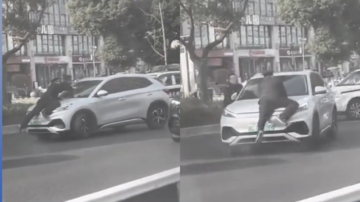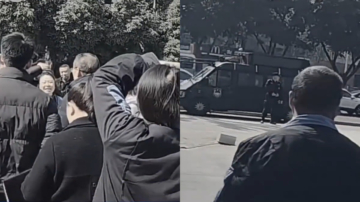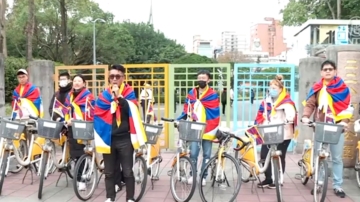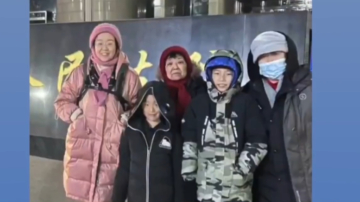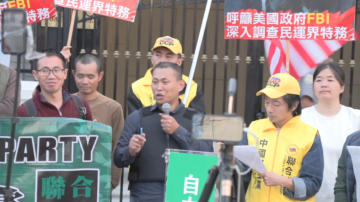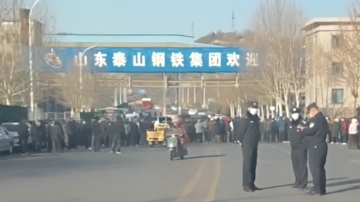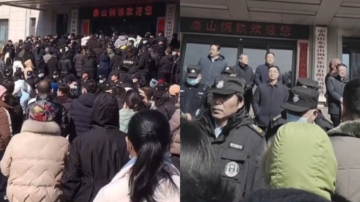【新唐人2013年08月01日訊】在中國大規模的城鎮化過程中,很多農民喪失了賴以生存的土地,成為所謂的「城鎮居民」。最近「中國社科院」出臺一份報告,顯示這些農民進城後,在各個方面都得不到公平待遇,從而引發各種衝突摩擦,造成社會矛盾加劇。下面請看報導。
7月30號,中國社科院「城市發展與環境研究所」和「社會科學文獻出版社」聯合發佈了2013《城市藍皮書》。藍皮書指出,中國真實的完全城鎮化率只有42.2%,比國家統計局公布的常住人口城鎮化率低10.4個百分點。
藍皮書揭示,農民失去土地進城之後,在政治權利、社會保障、公共服務、就業及教育等方面,都得不到公平待遇。再加上他們進城後,可能影響原住居民的既得利益,相互之間產生排斥,使社會矛盾加劇。
中國原《百姓》雜誌主編黃良天:「它倒不是農民要進城,而是因為他們失去了家園、還有他們賴以生存的土地。他不能夠自己擁有。」
多年來,中共各級政府熱衷於大搞基建、房地產,從中撈取大量錢財,這也就是所謂的「土地財政」。在利益驅使下,當局經常出動軍警、黑社會人員對不同意拆遷的民眾進行強力打壓,很多無辜民眾被打傷、致殘、致死,激起巨大民怨。上訪無門的農民在這種殘酷的「圈地運動」中無奈的失去土地,被迫成為所謂的「城鎮居民」。
《城市藍皮書》顯示,當前中國城鎮中,農業轉移人口高達2.4億人,佔到城鎮人口總數的1/3左右。
黃良天:「但是進城以後,他們(農民)又享受不到這種作為一個公民應該具有的這種社會福利,對農民沒有。所以在這種情況下,那只好到市政府去遊行了,去靜坐了。 」
雲南玉溪的一位農民向《新唐人》吐露心聲說,土地是農民最基本的生活資料。一旦離開土地併入城鎮之後,農民將面臨極大的生存壓力。
雲南玉溪農民 陳偉:「它是會把房價不斷的提高,然後農民增加了本不應該承擔的額外資本。農民真的很難。」
7月17號到24號,一週之內,北京市接連發生多起與公共安全相關的兇案,凸顯大陸民怨沸騰、各種惡性事件一觸即發。
這其中包括,山東男子冀中星因遭暴力執法毆打致殘,申訴無門,絕望之下,20號在北京首都機場引爆自製爆炸裝置、成為人肉炸彈事件。
香港《東方日報》評論認為,惡性案件不斷髮生,主要是因為社會矛盾長時間無法化解,很多上訪者只能用暴力手段來吸引官方注意。面對排山倒海般的民怨,當局不是去疏導,反而處處圍堵,期望通過高壓「維穩」手段,將民眾的抗議封殺。當今中國就像一口油井,只要一點火星,就會引發大爆炸。
北京憲政學者 陳永苗:「這種暴力案件,並不是人性本身的問題,而是政治問題。政治制度上的問題會帶來人心的扭曲,然後通過犯罪或者互相仇殺來發洩。」
7月25號,公安部要求嚴懲個人極端暴力犯罪事件。 28號,北京市公安局長傅政華宣稱,要以「盯苗頭、壓反彈、整秩序、保穩定」為重點,對當局認為的「嚴重刑事犯罪」要露頭就打。
《東方日報》評論指出,中共當局將弱勢群體當作目標的「維穩」思維,已走到窮途末路。自古以來沒有哪一個政權能靠暴力維持長久。如不疏理民怨,中國大大小小的「怨塞湖」遲早有決堤的一天,屆時將無人可以阻擋。
採訪/陳漢 編輯/李謙 後製/葛雷
China's Doomsday Book: Forced Urbanization of Farmers
During China's massive urbanization process,
millions of farmers were driven off their farmland,
forcing them into ‘urban ghettos’.
Recently, Chinese Academy of Social
Sciences (CASS) released a report.
It shows that farmers have suffered from injustice
and inequality after being herded into the city.
This has triggered intense conflicts, thus creating
a social time-bomb, primed to ignite at any moment.
On July 30th, CASS issued 2013 Blue Book of Cities in China.
The Blue Book noted that China's real urbanization rate is only
42.2%. It is 10.4% points lower than national statistics' report.
The Blue Book revealed that since farmers were
driven off their land and forced into the city,
they have endured all kinds of hardships and discrimination:
in political, social security, public services, employment, education, housing…
In addition, they face loss of native residency rights
and interests. Thus social conflicts have intensified.
Huang Liangtian, People magazine Editor-in-Chief:
"It is not that farmers want to move into the city,
because they lost their farmland that they rely on,
they no longer have a home."
Over the years, the Chinese Communist Party (CCP)
vigorously invested in infrastructure and real estate, so as to gain great profits.
They call this,‘land finance’. Driven by self interests and greed,
the authorities regularly send police, and thugs to beat and
oppress people who are against the demolitions.
Many innocent people were injured, disabled,
and beaten to death, this arouses great public's anger.
Farmer with nowhere to go from their seized lands,
they out of necessity became ‘urban refugees’.
The Blue Book states that currently, 240 million farmers were
forced to the cities, making up 33% of the urban population.
Huang Liangtian: "After being coerced into the cities,
farmers Could not obtain social welfare.
Thus, in vain they appeal and ‘sit-in’ protest to
the government."
A Yunnan farmer told NTD that
farmland is the most basic living resource for them.
Once losing it and moving to the city,
they face the daily specter of their very survival.
Chen Wei, a farmer in Yuxi, Yunnan:
"House prices are constantly increasing.
It is an extra cost for farmers that we shouldn't bear.
Farmers are finding it really difficult to live."
From July 17th to 24th, within a week,
several killing incidents occurred in Beijing.
It highlights the public's anger, serious incidents can
take place at any minute. The fabric of society is crumbling.
A man in Shandong was brutally beaten by police,
rendering him disabled. He has nowhere to appeal.
In despair, on July 20th, he strapped a home-made bomb
to himself in Beijing Capital Airport. It becomes a suicide bombing incident.
Hong Kong's Oriental Daily commented that
malignant incidents constantly occur,
because the social conflicts haven't been resolved for so long.
Many petitioners are forced to resort to violent ends
to gain the attention of those in power.
In the face overwhelming public discontent,
the authorities not only failed to ease the malaise,
but also use extreme violent suppression against the protests.
Today's China is like an oil well,
just a little spark will ignite a huge explosion.
Chen Yongmiao, Beijing constitutional scholar:
"These kind of incidents are not a human nature problem,
but a political issue.
Problems in the political system will cause warped
thinking. People vent their anger via crime or killing."
On July 25th , Public Security Ministry ordered stern
punishment for individual crimes.
On July 28th , Fu Zhenghua, the director of Beijing Public
Security Bureau issued brutal suppression methods.
He ordered a complete crackdown at the first sign of protest.
Oriental Daily said that the CCP regime targets
the vulnerable groups to maintain the ‘stability’.
It indicates the CCP has come to a dead end now.
According to history, no one can rely on
violence to maintain power for too long.
Without dealing with public anger, one day,
it will be like a burst river, no one can stop it.
7月30號,中國社科院「城市發展與環境研究所」和「社會科學文獻出版社」聯合發佈了2013《城市藍皮書》。藍皮書指出,中國真實的完全城鎮化率只有42.2%,比國家統計局公布的常住人口城鎮化率低10.4個百分點。
藍皮書揭示,農民失去土地進城之後,在政治權利、社會保障、公共服務、就業及教育等方面,都得不到公平待遇。再加上他們進城後,可能影響原住居民的既得利益,相互之間產生排斥,使社會矛盾加劇。
中國原《百姓》雜誌主編黃良天:「它倒不是農民要進城,而是因為他們失去了家園、還有他們賴以生存的土地。他不能夠自己擁有。」
多年來,中共各級政府熱衷於大搞基建、房地產,從中撈取大量錢財,這也就是所謂的「土地財政」。在利益驅使下,當局經常出動軍警、黑社會人員對不同意拆遷的民眾進行強力打壓,很多無辜民眾被打傷、致殘、致死,激起巨大民怨。上訪無門的農民在這種殘酷的「圈地運動」中無奈的失去土地,被迫成為所謂的「城鎮居民」。
《城市藍皮書》顯示,當前中國城鎮中,農業轉移人口高達2.4億人,佔到城鎮人口總數的1/3左右。
黃良天:「但是進城以後,他們(農民)又享受不到這種作為一個公民應該具有的這種社會福利,對農民沒有。所以在這種情況下,那只好到市政府去遊行了,去靜坐了。 」
雲南玉溪的一位農民向《新唐人》吐露心聲說,土地是農民最基本的生活資料。一旦離開土地併入城鎮之後,農民將面臨極大的生存壓力。
雲南玉溪農民 陳偉:「它是會把房價不斷的提高,然後農民增加了本不應該承擔的額外資本。農民真的很難。」
7月17號到24號,一週之內,北京市接連發生多起與公共安全相關的兇案,凸顯大陸民怨沸騰、各種惡性事件一觸即發。
這其中包括,山東男子冀中星因遭暴力執法毆打致殘,申訴無門,絕望之下,20號在北京首都機場引爆自製爆炸裝置、成為人肉炸彈事件。
香港《東方日報》評論認為,惡性案件不斷髮生,主要是因為社會矛盾長時間無法化解,很多上訪者只能用暴力手段來吸引官方注意。面對排山倒海般的民怨,當局不是去疏導,反而處處圍堵,期望通過高壓「維穩」手段,將民眾的抗議封殺。當今中國就像一口油井,只要一點火星,就會引發大爆炸。
北京憲政學者 陳永苗:「這種暴力案件,並不是人性本身的問題,而是政治問題。政治制度上的問題會帶來人心的扭曲,然後通過犯罪或者互相仇殺來發洩。」
7月25號,公安部要求嚴懲個人極端暴力犯罪事件。 28號,北京市公安局長傅政華宣稱,要以「盯苗頭、壓反彈、整秩序、保穩定」為重點,對當局認為的「嚴重刑事犯罪」要露頭就打。
《東方日報》評論指出,中共當局將弱勢群體當作目標的「維穩」思維,已走到窮途末路。自古以來沒有哪一個政權能靠暴力維持長久。如不疏理民怨,中國大大小小的「怨塞湖」遲早有決堤的一天,屆時將無人可以阻擋。
採訪/陳漢 編輯/李謙 後製/葛雷
China's Doomsday Book: Forced Urbanization of Farmers
During China's massive urbanization process,
millions of farmers were driven off their farmland,
forcing them into ‘urban ghettos’.
Recently, Chinese Academy of Social
Sciences (CASS) released a report.
It shows that farmers have suffered from injustice
and inequality after being herded into the city.
This has triggered intense conflicts, thus creating
a social time-bomb, primed to ignite at any moment.
On July 30th, CASS issued 2013 Blue Book of Cities in China.
The Blue Book noted that China's real urbanization rate is only
42.2%. It is 10.4% points lower than national statistics' report.
The Blue Book revealed that since farmers were
driven off their land and forced into the city,
they have endured all kinds of hardships and discrimination:
in political, social security, public services, employment, education, housing…
In addition, they face loss of native residency rights
and interests. Thus social conflicts have intensified.
Huang Liangtian, People magazine Editor-in-Chief:
"It is not that farmers want to move into the city,
because they lost their farmland that they rely on,
they no longer have a home."
Over the years, the Chinese Communist Party (CCP)
vigorously invested in infrastructure and real estate, so as to gain great profits.
They call this,‘land finance’. Driven by self interests and greed,
the authorities regularly send police, and thugs to beat and
oppress people who are against the demolitions.
Many innocent people were injured, disabled,
and beaten to death, this arouses great public's anger.
Farmer with nowhere to go from their seized lands,
they out of necessity became ‘urban refugees’.
The Blue Book states that currently, 240 million farmers were
forced to the cities, making up 33% of the urban population.
Huang Liangtian: "After being coerced into the cities,
farmers Could not obtain social welfare.
Thus, in vain they appeal and ‘sit-in’ protest to
the government."
A Yunnan farmer told NTD that
farmland is the most basic living resource for them.
Once losing it and moving to the city,
they face the daily specter of their very survival.
Chen Wei, a farmer in Yuxi, Yunnan:
"House prices are constantly increasing.
It is an extra cost for farmers that we shouldn't bear.
Farmers are finding it really difficult to live."
From July 17th to 24th, within a week,
several killing incidents occurred in Beijing.
It highlights the public's anger, serious incidents can
take place at any minute. The fabric of society is crumbling.
A man in Shandong was brutally beaten by police,
rendering him disabled. He has nowhere to appeal.
In despair, on July 20th, he strapped a home-made bomb
to himself in Beijing Capital Airport. It becomes a suicide bombing incident.
Hong Kong's Oriental Daily commented that
malignant incidents constantly occur,
because the social conflicts haven't been resolved for so long.
Many petitioners are forced to resort to violent ends
to gain the attention of those in power.
In the face overwhelming public discontent,
the authorities not only failed to ease the malaise,
but also use extreme violent suppression against the protests.
Today's China is like an oil well,
just a little spark will ignite a huge explosion.
Chen Yongmiao, Beijing constitutional scholar:
"These kind of incidents are not a human nature problem,
but a political issue.
Problems in the political system will cause warped
thinking. People vent their anger via crime or killing."
On July 25th , Public Security Ministry ordered stern
punishment for individual crimes.
On July 28th , Fu Zhenghua, the director of Beijing Public
Security Bureau issued brutal suppression methods.
He ordered a complete crackdown at the first sign of protest.
Oriental Daily said that the CCP regime targets
the vulnerable groups to maintain the ‘stability’.
It indicates the CCP has come to a dead end now.
According to history, no one can rely on
violence to maintain power for too long.
Without dealing with public anger, one day,
it will be like a burst river, no one can stop it.

